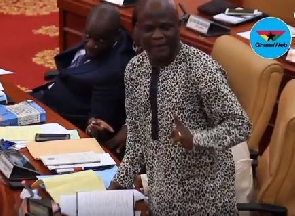Minority members in Parliament have tasked government to present the Right to Information Bill to the House to be worked on into law to boost the fight against corruption.
The call came up during the debate to consider the approval of the report of the Appointment’s Committee on Martin Alamisi Burns Kaiser Amidu as Special Prosecutor.
Contributing to the debate in the House, deputy Minority Chief Whip, Ahmed Ibrahim indicated that though the Office of the Special Prosecutor is a laudable idea, corruption cases could only be fought with evidence.
He suggested that without evidence, the Special Prosecutor may fail in his duties.
Ahmed Ibrahim argued that the fight against corruption is a shared responsibility as such everyone should have equal and unhindered access to information to ensure that factual allegations are made against people.
He bemoaned the rate at which people rely on perception as evidence of corruption and condemned such acts insisting that it derails the corruption fight.
The Banda MP explained “the Special Prosecutor nominee is saying that he will use the auditor general report that will be debated in parliament as the basis.
Mr Speaker if you go to article 21 clause 1(f) in the constitution, it is clear that this house or Ghana must pass the Right to Information bill.
Mr Speaker fighting corruption is a shared responsibility, it is not the preserve of only one personality and everybody no matter which side you belong to we must all contribute but what if you don’t have the information? What if you have no right to the information?
Mr Speaker much as we want to fight corruption, we must take urgent steps to pass the Right to Information Bill into law and that will create the access for you, for the media, for everybody so that corruption will not just be based on perception.
Somebody raised corruption allegation then when pushed to the corner then he responds it was a perception. I believe Mr Speaker that the best remedy to do away with perception and come to the realities whereby if allegations are made against somebody you can use the RTI law to press and get the right information and that will do away with the perception and Ghana will be seen to be really fighting against the incidence of corruption ”.
His colleague on the Minority side, Emmanuel Bedzra during the SONA debate last week argued that even though the Special Prosecutor was good and will contribute to the corruption fight, it was not in itself the ultimate panacea to the canker.
The Ho West MP was convinced allowing people access information at the Municipal, District, Metropolitan, Ministries and other public offices will enormously help in minimizing the canker to the barest minimum.
“If really we want to fight corruption, we need information from the ministry, we need information from departments, we need information from all agencies but where is the Right to Information Act and where is the Bill that we all worked on in the Sixth Parliament to the extent that we have gotten to consideration stage”.
Parliament approves Martin Amidu
Parliament on Tuesday, February 20th approved Martin Amidu as the first occupier of the Office of the Special Prosecutor.
The debate to approve him was challenged by former deputy Attorney General, Dominic Ayine who requested that the process is halted as his suit against Mr. Amidu’s nomination is still pending at the Supreme Court.
Dr. Dominic Ayine’s suit at the Supreme Court is challenging the nomination of Martin Amidu for the position of Special Prosecutor because of his age.
In his argument, he said the Office of the Special Prosecutor falls under the broad category of public officers who by the constitution must retire by age 60 with a possible extension to 65 years.
Citing Standing order 93(1), Dr. Ayine prayed the Speaker of Parliament to give his opinion on the matter to serve as judgment challenge he put up.
Citing Standing order 93(1) suggests that Parliament shall not discuss any matter in Court in a manner that will be prejudicial to the case in Court.
But the Speaker of Parliament, Professor Aaron Mike Oquaye, ruled against Dr. Ayine’s argument thus making way for Amidu’s approval.
The Speaker explained “in this particular case it is notable that the circumstances of the case, the nature of the case, the relief being sort, the stage that proceedings have reached or all such relevant other matters were not brought before this honourable House.
The separation of powers requires that all three arms of government must be given their due regard if the mere filing of a writ in any court should stop parliament from doing its work, then of course parliament is subjugated automatically to the courts, there must be mutual respect between all arms of government, the legislator, the judiciary and the executive.
There is nothing before me this morning to persuade me that the matter allegedly before the court or any matter regarding same or any order made by the court alleged today is such that Parliament cannot do its work”
“The motion is accordingly rejected” he concluded.
In the report that was accepted leading to Martin Amidu’s approval, the Committee recommended among other things that “given Mr. Martin Alamisi Burns Kaiser’s high standard of competence, forthrightness in answering questions, independent-mindedness, selflessness, solid principles and an in-depth appreciation of the task ahead backed by his onerous experience, knowledge of the law and his promise to be above political colourisation, the Nominee qualifies to serve as the Special Prosecutor”.
General News of Tuesday, 20 February 2018
Source: www.ghanaweb.com













